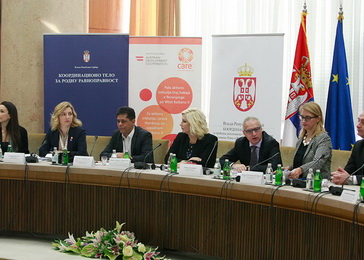 Roma women are among the most vulnerable social groups, numerous data point to their social inequality and the EU plans on investing more money in their integration, said participants in a two-day regional conference on Roma women empowerment.
Roma women are among the most vulnerable social groups, numerous data point to their social inequality and the EU plans on investing more money in their integration, said participants in a two-day regional conference on Roma women empowerment.
The Deputy Head of the EU Delegation to Serbia Mateja Norcic Stamcar said that the EU had so far allocated EUR5 million for regional cooperation in the area of Roma women empowerment. We have thus far donated EUR11.4 million to Serbia in support of its Roma integration efforts and we plan on supporting it with another EUR20 million.
“By being both women and belonging to Roma population, Roma women are faced with double discrimination. Entering Roma children in the registries of birth, deploying 20 mobile teams bringing Roma closer to fundamental rights, offering grants to Roma civil society organisations… these are some of the examples of EU support in this area,” said Norcic Stamcar.
She added that the EU was also working to find housing solutions for 11 Roma communities. Over the past two years, we have awarded scholarships to over 1,000 high school students, she said.
Deputy Prime Minister and Minister of Construction, Transport and Infrastructure Zorana Mihajlović said the EU and the European Commission provided substantial assistance for integration of Roma, adding that Serbia was also allocating its own funds for that purpose. She said the Government took pride in strategic documents, the action plan and budget funding, adding also that Serbia had access to EUR9.2 million worth of IPA projects and that “in the coming period, Serbia will discuss how to make most of that money.”
The Secretary General of the Regional Cooperation Council Goran Svilanović said that EU institutions and the Council designed a project which they have been supporting for the past three years and will continue to do so in the next three, with even more money. “The idea was to do something to improve the status of Roma in the region, support the governments and their national Roma integration programmes in order to achieve results better than the ones they had originally planned. Improving the status of Roma does not mean doing anything in particular for them – it should rather be regarded as taking into account the society as a whole and seeing how dire is the need to make Roma part of that society,” Svilanović said. He noted that there is much discrepancy between the Roma community and other communities across the region; that a number of Roma do not receive elementary education, while only 1 per cent of Roma university students actually graduate. “Nine in ten women Roma are unemployed. The idea is to support them in finding jobs. The family dynamics shifts when a woman has a job, the attitude towards the society changes, because they feel like they have a say in the community,” Svilanović added.
The regional conference “Economic (in)dependence of Roma women: challenges and early causes” was organised jointly by the Regional Cooperation Council’s Roma Integration 2020 Action Team and Balkan International.
Source: europa.rs
 Government of the Republic of Serbia
Government of the Republic of Serbia















 pdf [271 KB]
pdf [271 KB]
Leave a Comment